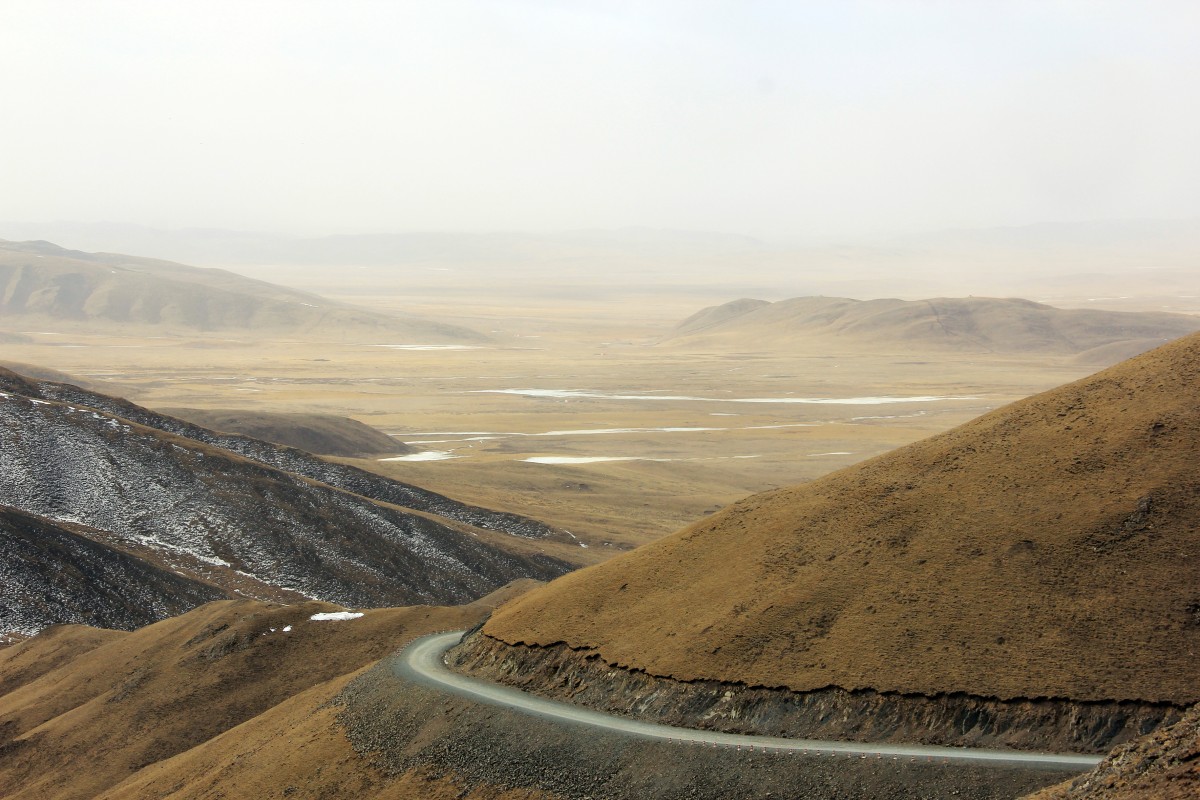We packed our bags and left the hostel in Xiahe at 9am in the morning. It was a beautiful, cold day again in this dry, arid climate at the start of the mighty mountains of the Tibetan plateau. We opened the car and organized our bags and the ‘F & B box’ on the backseat. We left some water in the car overnight which got completely frozen after a night of -20 degrees outside. Interesting enough the apple juice was not frozen which makes you wonder about the ‘healthiness’ of this juice…
15 min out of Xiahe we took a right from the main road, south-west towards the mountains bordering Gansu and Qinghai province. We knew this was going to be a long day with plenty enough challenges coming up. What would the road conditions be? Would our car survive? Where would we sleep?
The road is deserted. This is a part of China where almost nobody is living due to altitude and climate conditions. Almost 2/3 of China’s landmass in uninhabitable. Most people locate themselves in the fertile plains of the Yellow and Yangtze River and the deltas in the east of the country. The average population density in China is more than 3000 people per square kilometer while the top metropolises such as Chongqing, Shenzhen, Guangzhou, Beijing and Shanghai top this in their urban areas by 50,000 people per square kilometer (for reference, Amsterdam has an average population density of 4700 people per square kilometer). The area we are driving through has an average density of 2 people per square kilometer.
Every once in a while we stop the car and take photos and videos of the breathtaking scenery. It is important to dress up before exiting the car as the wind is fierce and without a hat, gloves and a proper jacket it is easy to imagine the devastating consequences. Also of importance is that the engine keeps on running…it is our lifeline and only source of heating in this barren climate. All our liquids would be easily frozen overnight despite of course the vodka and that chemical apple juice that suddenly comes in handy in this situation.
What would the road conditions be? Would our car survive? Where would we sleep? Maren
After two hours of driving there is an intersection in the middle of nowhere. The road sign indicating directions is flipped around, blown by the wind. We are trying to identify characters between the road sign and the roadmap we have. The GPS we are using is not working and besides, Maren has this weird fascination with maps and wants to do this the ‘old school’ way.
We decide to take the road westwards over the mountains. With nobody on this road or any kind of human activity in sight it becomes a bit more adventurous driving… what if we can’t go any further, and need to turn around? What if it is the wrong way? What if the car breaks down? After an hour of gradually downgrading road conditions, while slowly ascending, we see a house and someone walking next to the road. “Let’s ask him!” we both shout at the same time.
What if the car breaks down? Maren
The person we are approaching is hardly recognizable as he is wearing a coat made out of yak fur and a large hat, covering his face. Maren gets out of the car and walks toward the man. Mandarin is not very useful in this part of China as people speak their local dialect and the influence from Beijing seems far away. So it is back to square one whereby arm waving, facial interpretation and a smile are the most useful skills.
Maren says “Zekog”, the guy repeats and simply points into the direction the road is heading
One of the maps we have taken with us is providing names of cities in this part of China in pinyin and in brackets in the local dialect. This is essential to be able to talk to locals. Zekog is Tibetan for Zeku which is the next ‘big’ town in the nearby vicinity. Especially the ‘g’ sound is rather strong in Tibetan language so our Dutch native tongue with all its ‘g’ comes in handy! The man, a little overwhelmed of two white faces in a car in his backyard, repeats “Zekog” and points the same direction. We repeat this ritual another two times and thank him with a big smile.
We continue our journey through the mountains into Qinghai province with still a long, empty road ahead…







Comments 3
Hello there
Ik hoop van harte dat het een droomreis wordt en hoor graag hoe het met jullie gaat. Heel veel sterkte en genieten maar. (Sorry, dat ik dacht dat jullie al op 18 juni zouden vertrekken.
Bye, bye and see you
Van Janny
It’s awesome in favor of me to have a site, which is good
designed for my experience. thanks admin